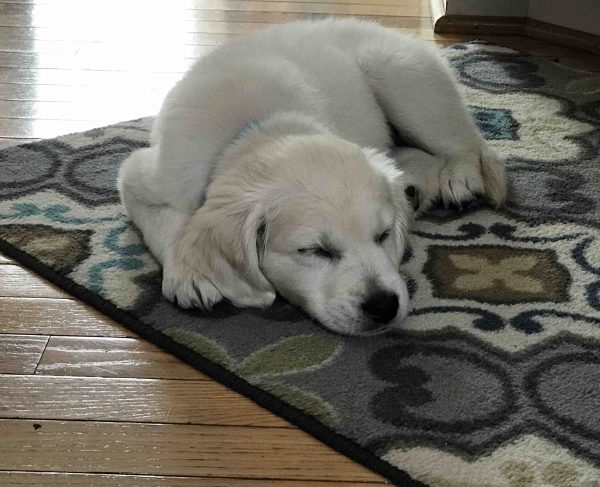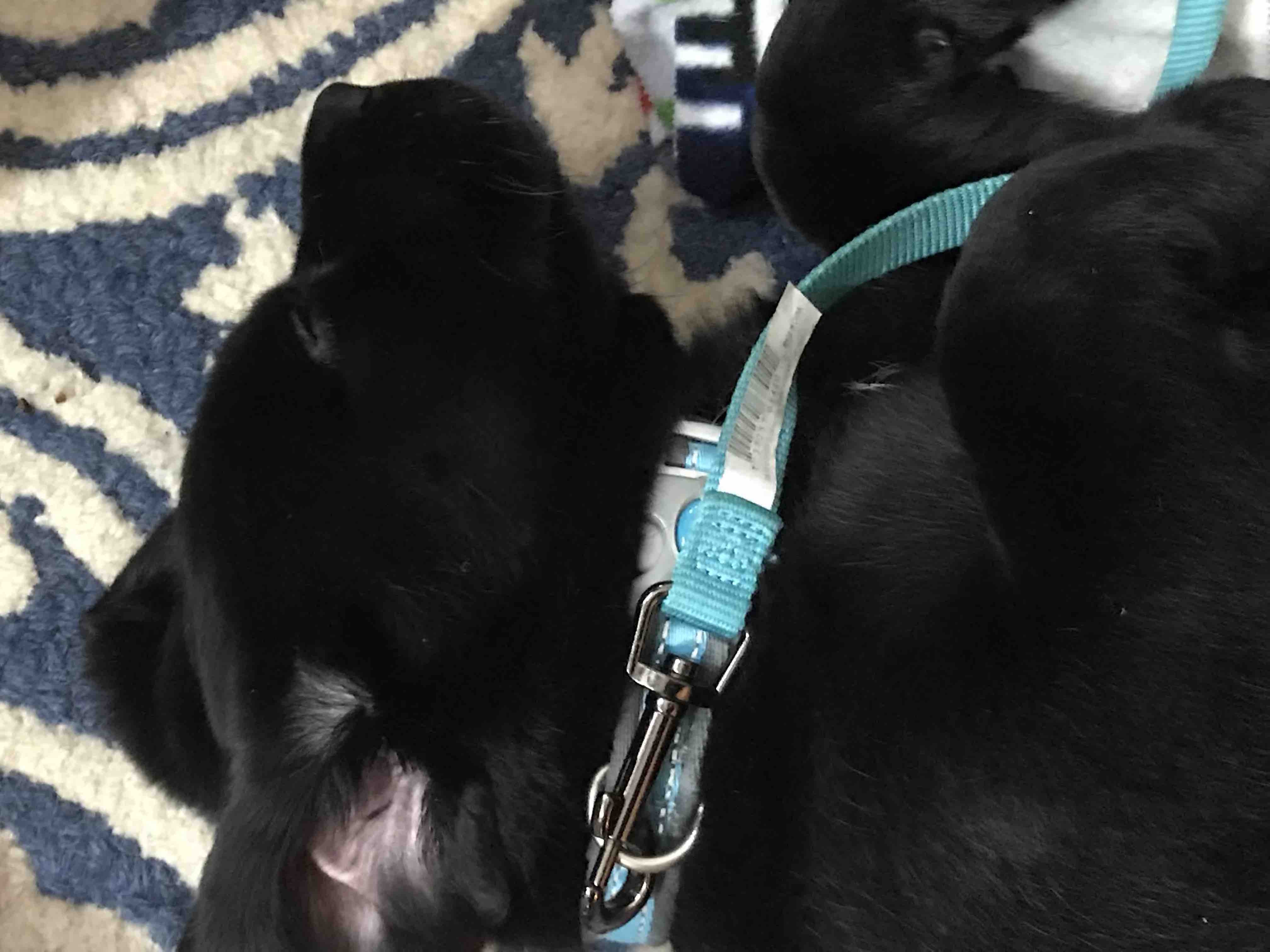Your puppy probably needs more sleep

Why–and HOW–to establish healthy sleep habits for your puppy starting today
Puppies definitely have a lot of energy. They absolutely need constant supervision, so that they don’t chew things and eat things they shouldn’t. Puppies use their mouths to explore, play, and even protest. But this puppy, like so many puppies whose behavior is completely over the top, probably just needs more sleep.
How much sleep? For most pups under 4 months, I recommend 16-20 hours of sleep per day. Often pups like the one from my phone call are getting closer to 10-12 hours of sleep.
Like babies, puppies need lots of sleep! But also like babies, they often won’t put themselves to bed
Remember that dogs are predators, carnivores. Their bodies are made to rest most of the time (biologically, this conserves and stores energy for the hunt). Although our dogs won’t need to hunt for their meals, core genetics just don’t change over a handful of generations. Even the most active of working breed dogs, will spend most of their down-time sleeping.
Young animals, of every sort, need sleep for growth and development, especially for BRAIN growth and development. In my experience, puppies who lack sleep have little impulse control, have a hard time learning, and, ironically, have a really tough time settling down.

It’s like their brains are in an adrenalized state of overdrive, just to keep their bodies going. They are more frantic in their activity, less able to control their mouths, and just don’t seem to “listen”.
Most pups start the day well-rested after a night of sleep, behaving like the perfect little angel-puppies in a holiday greeting card commercial. They may grab a nap here and there throughout the day, but if it’s not enough, or if it’s just dozing, that sleep is not enough to recharge their brains, and by mid-afternoon, out comes the “bad” gremlin…
Establishing and promoting healthy sleep habits is not difficult, and will actually free you from a lot of the overwhelm of owning a puppy.
Three key ways you can help your puppy get enough sleep
1Crate train your puppy, and use the crate for nap times throughout the day. Sleeping in a crate (especially if you cover that crate in the early days) allows your puppy to completely wind down. Because he knows all the interesting things outside are not in play, he can really relax—he won’t be keeping one eye open and one ear cocked for potential fun or food, the way he does when he grabs a quick nap on the floor.
Putting your pup in his crate for naps has several added “big picture” benefits: he’ll learn to associate the crate with being calm and relaxed, so when you use it to contain your pup while you’re out of the house, he’ll be pre-programmed not to stress out.
Also, perhaps more importantly, having your pup nap in a crate means YOU get a break from the constant supervision. When he wakes up, he won’t immediately pee (most pups come with a pretty well developed instinct to keep their sleeping place clean, even way before they’re completely house-trained, so you have a couple minutes’ grace). He also won’t be able to get to your expensive new shoes before you realize he’s even up.
2Establish a structured schedule. You’ll alternate “active” time–short periods of training, exploring, socializing, or play, with “nap time” throughout the day.
For the youngest of puppies, their “active” time will likely last an hour or less, and then they’ll be ready to sleep for 2 hours or more.
A structured schedule provides predictability and routine to a dog’s day. This also brings predictability and routine to YOUR day, of course, which can help to relieve some of the stress of owning a puppy. While you’ll still see him fatigue as the day goes on, he won’t be working from a totally empty tank.
3Finally, provide appropriate forms and amounts of mental and physical stimulation. Take a few minutes to work on skills he’s learning, or to teach something new! Play an interactive game with your pup! Go for a short sniffy/exploration walk!
Activities that stretch the mind as well as the body help you both build a strong connection, but also set your puppy up to sleep well and deeply when it’s time for rest.
Nearly all my students who implement healthy sleep habits report a big improvement within a week. Their puppies still tire by the end of the day…of course! They’re babies, and learning and growing are hard work!
While good naps throughout the day will partially top off their pup’s batteries, that long, overnight, sleep is still necessary to fully recharge.
The good news is, an adequately rested puppy learns faster and better, so you’ll have a much easier time achieving your long-term companionship goals (and no longer need to buy band-aids by the mega-box size!)
**WHEN TO GET HELP**
If you’ve implemented healthier sleep habits for a full week, and are not seeing any improvement, please reach out for professional help! Your puppy may have other things going on that can be resolved easily at a young age, before they’ve become long-ingrained behavior patterns.
I’d love to hear about the changes you see in your better-rested puppy! Let me know in the comments below! ↓
